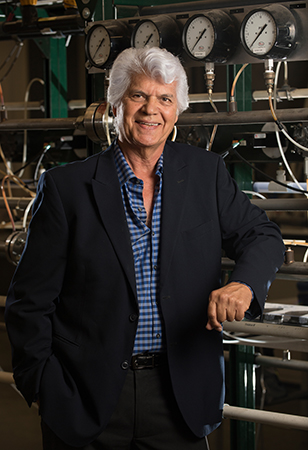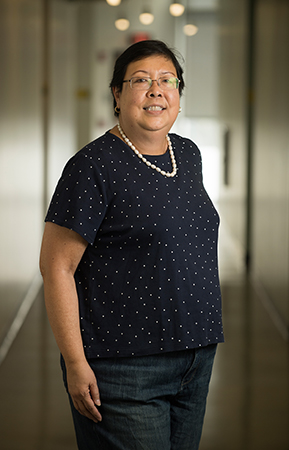Faculty Donors
Rhonda Rhodes
Professor of Technology & Operations Management
College of Business Administration

What motivates you to work with students?
Brains and energy. I can’t think of a better way to spend a career than with young people who have brains and energy and will become our future leaders. I love to challenge students to think differently. Cal Poly Pomona students are an exceptional bunch. Most work at least part time, and many are the first in their family to get a college degree. They are exceptionally motivated to excel, which in turn motivates me. Seeing brains and energy in action has motivated me for 33 years.
Tell me about an experience that inspires you.
An MBA alumnus once told me about his experience in working with other MBA graduates from Harvard, Wharton, UCLA and Berkeley. At first he was intimidated by their degrees, but that changed. He said, “They knew how to talk theoretically about a project. As a Cal Poly Pomona graduate, I knew how to do the project – to plan, implement and complete a project, not just talk about it.”
I believe a university education should make you a better person and not be strictly vocational. But let’s be realistic. Unless one is independently wealthy, one must earn a living. A four-year college degree should prepare you for the future, and the future includes working.
Why donate to the university?
Our educational system must change. It can no longer be “business as usual” because the state just can’t pay for everything. Donating to Cal Poly Pomona provides extras for the students that the state just can’t provide. Also, it makes me feel good to give back. And, as a business person, I must mention, it is tax deductible.
What is Cal Poly Pomona’s role in Southern California?
No other university in Southern California has 1,400 acres of beautiful land, Arabian horses, livestock, a student-run restaurant, a Farm Store and opportunities for students to work in a hotel or to get funding for a new product they developed. We are a polytechnic university and we should not lose sight of this fact.
 Abdul Rashidi
Abdul Rashidi
Civil Engineering Professor
College of Engineering
Why do you donate to Cal Poly Pomona?
My contribution is to provide students and educators the resources needed to excel in their educational program. I have chosen Cal Poly Pomona because it has been providing the technical and leadership needs primarily in Southern California, a place I call home.
What motivates you to teach students?
I did my undergraduate work at the University of Cincinnati, which had a co-op program, requiring one year of practical training or internship. The internship helped me to become a better student and also introduced me to another dimension of engineering work: the invaluable mentorship I received from my superiors and colleagues. I too wanted to bring my real-life engineering knowledge into the classroom and share it with students who may not have the opportunities I had.
How did scholarships support your education?
I was fortunate to have scholarships to pursue both undergraduate and graduate work. It contributed enormously to my professional and personal success. Without it, life may have taken a less successful route.
What’s the benefit of donating to the university?
Today’s students will be tomorrow’s leaders! The role of a university is to educate and prepare students for such future challenges. This is the ultimate benefit.
 Juanita Roxas
Juanita Roxas
Professor of International Business & Marketing
College of Business Administration
What do you teach?
International business and different courses in marketing. I have taught the gamut of our marketing classes except for sales and promotion.
What motivates you to teach?
Watching them blossom from insecure first-time freshmen or transfer students to the confident seniors when they graduate. Some graduate with trepidation. But at times, they come back as professionals and surprise me even more. I barely recognize the quiet student in the corner when he/she comes back for alumni panels or alumni events.
What do you enjoy about working with students?
I have the opportunity to point out possibilities that students never considered or knew existed. I can almost see a lightbulb over their heads. As a student who was chronically academically in trouble and graduated with a decent GPA, it is gratifying to see that.
Any specific stories that come to mind?
After 27 years, there have been so many different instances that I don’t have exactly one that stands out. I have had close mentoring relationships with students early in my career. They have moved on to find employment and careers.
Iris Levine
Music Professor and Interim Associate Dean
College of Letters, Arts & Social Sciences
 Why do you donate to Cal Poly Pomona?
Why do you donate to Cal Poly Pomona?
When I became department chair, Barbara Way was the dean and talked about the importance of giving back to the college. She said, “I don’t care what you decide to give, but give something.” Her words were very meaningful to me and I did what she suggested. I continue to donate directly to CLASS because of that.
When we were planning the Steinway Initiative in the music department, I knew that we needed donations from a variety of sources, big and small. I also knew that before I could walk up to a donor and comfortably ask him or her to give, I had to give at the highest level possible. So, I did. I also repeated Barbara Way’s words to my faculty: “I don’t care what you give, but I would like to see 100 percent participation from faculty and staff. It’s about you participating in this group initiative so that we can move things forward.” I’m proud to say that they responded.
Tell me about a particular student who inspires you.
I had a student who came from a difficult home situation. She didn’t have family support, was living in her car and wasn’t emotionally prepared to start school. In the second week of her freshman year, her father died. We became her home, and every one of us held on to her to make sure she was going to be OK. We supported her with scholarship money, on-campus housing and in every possible manner. She became an extraordinary graduate. She taught in local schools, got her master’s degree and is now in a doctoral program at a prestigious school in the Midwest. We still communicate on a weekly basis. She talks about how her Cal Poly Pomona family saved her.
What is Cal Poly Pomona’s role in Southern California?
We need to produce the leaders of tomorrow: strong citizens, people who are able to do innovative work and to be big thinkers and big dreamers. We have a responsibility to develop good citizens who care about making the world a better place.
Dorothy MacNevin
Education Professor and Coordinator of Graduate Studies
College of Education & Integrative Studies
 Tell me about a student who inspires you.
Tell me about a student who inspires you.
I recently served as a dissertation chair for a student teaching in an alternative high school setting. Her research focused on former gang-affiliated students who had completed their high school diploma. Her extraordinary dedication to working with this at-risk population is a remarkable story. She’s earned the hard-won respect from her flock for the caring, tireless, rigorous way that she transforms the lives of resistant, recalcitrant youth inspired to follow in her footsteps.
Why do you donate to Cal Poly Pomona?
Headlines herald dramatic things that are accomplished through the generosity of rich, famous, mega-donors. Although it sounds trite, the truth is that miracles are possible if enough ordinary people make ordinary giving a regular habit.
What is Cal Poly Pomona’s role in Southern California?
The real challenge is to conceptualize a vision of excellence that is fueled by dedicated leadership and the human and fiscal resources necessary to sustain profound levels of innovative change by investing in human dreams and human talent to elevate the human condition. We should exemplify what it means to make higher education “higher,” as well as deeper and broader so that dreamers and doers work together to engineer how to put wings on dreams. We should honor the poet, as well as the physicist, the veterinarian, violinist, accountant and artist. We should celebrate the ties that bind us and bond us as we seek to shape the future in a world that sorely needs the best that we have to offer.
Final thoughts
I wish I had $1 million to donate to Cal Poly Pomona. Maybe someday!
David M. Adams
Philosophy Professor
College of Letters, Arts & Social Sciences
 Why do you donate to Cal Poly Pomona?
Why do you donate to Cal Poly Pomona?
I began donating years ago as part of the project to renovate the Kellogg House mansion. Going back at least 25 years, my department has held our annual end-of-the-year banquet at the mansion. Over the years, numerous alumni have returned for these events. These gatherings are special for me as a source of connection with and pride in our students and their success.
Tell me about a particular student who inspires you to give back.
Several years ago, I taught a transfer student who was eager to learn but lacked self-confidence and seemed to struggle in class. I subsequently learned that because one of her parents was disabled, she supported herself and paid for her education by working long nights in the office of a large hotel. I watched her grow in poise and discipline, taking on challenging internships and finding time for community service. She graduated and is now in law school, fulfilling a deep ambition. I am immensely proud of her. She typifies for me the kind of transformation that Cal Poly Pomona can help to produce.
What is the university’s role in Southern California?
I think Cal Poly Pomona’s role is to afford an opportunity for those who would not be able to attend a private college or university to obtain a solid technical and humanistic education. On our campus, it is still possible to develop one-on-one relationships with faculty mentors.
What other types of philanthropy are you engaged with?
I try to give small amounts to a variety of charitable causes, including the Foothill Family Center, the Los Angeles Mission, the Friends of the Pomona Library, the Upland Police Foundation, the Library Fund at UC Berkeley and the Mother’s Club Preschool in Pasadena, which provides assistance to low-income parents.
